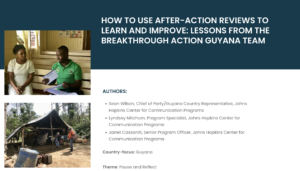Breakthrough ACTION staff were interviewed by The Curve to develop a case study and share lessons on using after-action reviews (AARs) with the Guyana Ministry of Health to develop a national malaria social and behavior change strategy and campaign.
Lessons summary:
- Start small and build: The initial few AARs focused on small activities conducted with government partners. Reviewing a relatively inconsequential activity allowed the partners to participate safely and easily in the AAR process and gain a firsthand understanding of its purpose, process, and ultimate value. Subsequent AARs focused on bigger activities with more partners, culminating in an AAR that covered the entire 2018 mosquito net distribution campaign. AARs don’t always pay dividends immediately.
- Informality: While the AARs have a structure and process, they don’t have to be entirely formal. Guyana’s AAR experiences show that the partners get the most out of the activity when the facilitation is conducted with flexibility and fluidity. AAR processes are more productive when they are fun and enjoyable.
- Virtual tools enhance AARs: Conducting AARs over web conferencing software allows more people to join. Transparency and comfort improve when notes are taken collaboratively in real time and made visible through a screen share.


